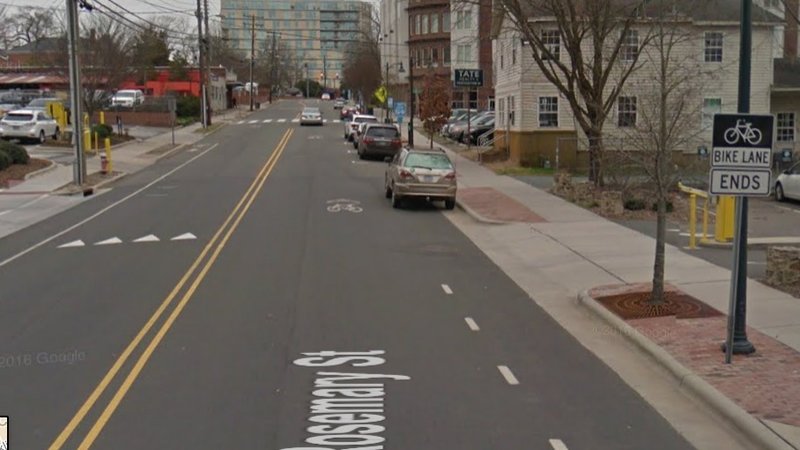A new column in the Chapel Hill News by OP Editors Molly De Marco and Travis Crayton and Seth LaJeunesse calls for improved bike and pedestrian infrastructure that prioritizes people over cars. Read the column below:

Recently, each of us has had opportunities to travel to other cities and get a feel for how people move through different environments to get from place to place. All of us recently used Capital Bikeshare in Washington, D.C., and one of us also used bikeshare programs in New York City and Denver.
Through these experiences, one thing became clear: You learn more about traffic and safety from a bicycle seat – or as a pedestrian, for that matter – than you do from the seat of a car.
New York City, with its reputation as a heavily trafficked city with an aggressive driving culture, actually feels relatively safe for cyclists. In part, this is thanks to implementation of a “complete streets” approach, which has led to a significant number of protected bike lanes throughout the city, narrower streets that slow car traffic, and additional buffers that protect people not in cars from those in them. All of these strategies lead to both a greater sense of safety for people who walk or bike, and for actual safety for people using these modes of transportation. That greater safety not only benefits those who were already biking or walking, but it encourages others to choose to bike or walk too.
D.C.’s cycling infrastructure is less robust than New York’s, but investments in recent years have expanded bicycle infrastructure and grown the bikeshare program. As DC Metrorail undergoes extensive maintenance, Capital Bikeshare is experimenting with low-cost, no-membership, 30-minute trips to expand the number of residents using bikeshare to get to their destinations.
Denver’s investment in bicycle infrastructure felt less significant, with many of its streets still focused solely on moving cars. But signs of change are there. In front of its iconic Union Station, the city has installed a buffered bike lane. Near the University of Colorado Denver campus, a bike lane buffered by parking has been installed.
Locally, UNC and the towns of Carrboro and Chapel Hill are in discussions about implementing a joint bikeshare program. As these discussions move forward, it is important to note that the success of a bikeshare program isn’t just about the program itself – it’s also about the quality of the overall cycling environment and experience. If our streets remain unsafe and uninviting, without dedicated space for cyclists to operate safely away from cars, a bikeshare program is unlikely to be the success it could be in a community that already leads North Carolina in the number of people commuting by bicycle.
That’s not to say progress has not already been made. The Town of Carrboro, working with the N.C. Department of Transportation, put West Main Street on a “road diet,” meaning that the road changed from a four-lane road striped only for cars to a two-lane road with a center turn lane and bike lanes in both directions. As part of a larger safety improvement project, the town also put Jones Ferry Road on a diet and added sidewalks and bike lanes. The town is now exploring creating a protected bike lane on Jones Ferry that will use flexible bollards to discourage drivers from crossing into the existing buffered bike lane.
IMPROVING THE VIABILITY OF WALKING AND BIKING AS OPTIONS HAS MANY BENEFITS: LESS TRAFFIC CONGESTION, IMPROVED HEALTH, BETTER AIR QUALITY, LOWER NOISE POLLUTION, A GREATER SENSE OF COMMUNITY, AND MORE SPENDING AT LOCAL BUSINESSES.
In Chapel Hill, Sage Road now has a striped green bike lane at the roundabout. Downtown, green sharrows have been added to Church and Ransom streets, but more significant improvements have yet to come. The Chapel Hill Bike Plan calls for bike lanes along Rosemary Street, though it is unclear if this plan will be enacted as Rosemary Street undergoes repaving. Here bikes lanes compete with on-street parking spaces. Those parking spaces have become important to small businesses in the area as Shortbread Lofts is leasing out many of the surface lots in the area to accommodate all their residents who want to have cars. An even greater opportunity for improving cycling infrastructure exists on Franklin Street, which is as wide as six lanes in some places. Providing safe space for cycling along this major connection across our communities would make great strides for promoting the use of bikes. Coming updates to the Franklin-Merritt Mill intersection also hold promise for improving bike connectivity into Carrboro.
Improving the viability of walking and biking as options has many benefits: less traffic congestion, improved health, better air quality, lower noise pollution, a greater sense of community, and more spending at local businesses. Chapel Hill and Carrboro will fall short of accruing these and other benefits if decision makers fail to truly support bicycling and walking.
Only through direct experience, experience made possible by a network of safe, convenient, and comfortable spaces to bike and walk, will most residents and visitors sense how cycling and walking benefit them and their communities. It is therefore up to the leaders of our towns to grant us all a chance to enjoy the personal and community benefits of getting around on foot or by bike. We would all be better off for it.
Molly De Marco and Travis Crayton live in Chapel Hill. Seth LaJeunesse lives in Carrboro. We welcome responses to this column at editor@newsobserver.com
Read more here: http://www.newsobserver.com/news/local/community/chapel-hill-news/chn-opinion/article114841508.html#storylink=cpy



Comments
Biking
Chapel Hill needs to catch up on providing safe biking infrastructure. With the new bike plan is in place, and bonds passed, it is a good time for advocates to tell the Council what needs to happen next.